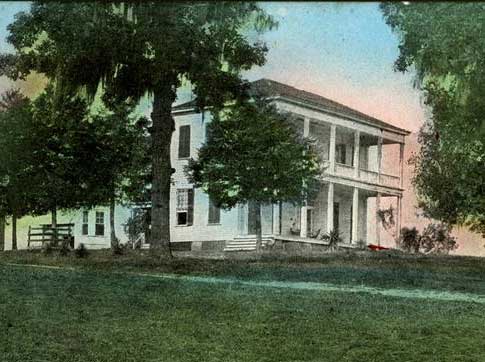Union Army Occupies Cook Plantation
By
Rebecca
B. Drake & Sue B. Moore
As early as 1840, McKinney L. Cook, a planter from North Carolina, and his wife, Jennette Winter Cook, purchased approximately 800 acres of land near Amsterdam (later known as Edwards). Here, overlooking the Port of Amsterdam on the Big Black River, the Cooks built a magnificent mansion. The two-story house with spacious porches was known as the McKinney Cook Mansion. Cook amassed a fortune, not only as a planter, but also by partnering with Joseph E. Davis, Jefferson Davis’ older brother, to purchase the patent for the Yost Plow and Cotton Scraper. The horse-drawn farm implement was a must for all planters producing cotton on a large scale. The 1850s were good years for the Cook family. Cotton was bringing top dollar and their daughter, Mary, was married to William T. Ratliff, a highly respected citizen of Clinton and Raymond. In 1861, Ratliff joined the 1st Miss. Light Artillery and prepared to defend his homeland against Union invasion. In May of 1863, as Grant’s army marched inland, Cook feared the worst since his plantation was situated along the Edwards-Vicksburg road, only three and a half miles east of the Big Black River Bridge. On May 16, 1863, his fears came true as the Confederates, defeated at Champion Hill, raced past his plantation with the Yankees in hot pursuit. Weary from a long day of battle, a number of the Union soldiers stopped on the grounds of the Cook Plantation to “stack arms” and enjoy some much needed rest. On May 26, 1863, a week after the Union victory at Champion Hill, Lt. John Quincy Campbell, Fifth Iowa Infantry, Third Brigade, wrote of the battle to his family: “…After the rebels skedaddled at Champion Hills, we rested a while on the battlefield, and then moved on and camped a short distance beyond. Our second brigade was left to bury the dead. On the 17th [morning after the Battle of Champion Hill] we started at an early hour for Vicksburg. Soon after starting, we heard the boom of a cannon ahead and expected to have another fight – but we were not “counted in.” We passed Edwards Depot where the rebels burned a train – and marched on to Cook’s plantation, 3 ½ miles from the Black River Bridge, when we marched into his grassy yard and stacked arms. Just as we stacked arms, a dispatch came from the front, stating that McClernand had captured between three and four thousand prisoners and seventeen pieces of artillery, and we had driven the rebels across the river…We remained at Cook’s plantation until 9 o’clock next morning…” Fred Grant, 13-year old son of General U. S. Grant who was with his father during the entire Vicksburg Campaign, also made note of the Cook mansion in his memoirs: “The next morning [May 17], we made an early start, and moved toward the Big Black River. When we halted near the railway bridge, General Grant and his staff occupied the porch of a fine plantation house.” The Union occupation of the Cook Plantation left the family in ruins. McKinney Cook died soon afterwards, leaving his widow and son to manage the massive debts. In 1867, the Cook’s advertised the sale of the plantation in the Hinds County Gazette, but the U. S. Military Commandant of the District stopped the transaction from taking place. During the 1880s, Col. William T. Withers, a Confederate veteran and Edwards resident, worked to help to establish a Negro College in Hinds County. Withers recommended the vacant Cook Plantation and in 1882, the McKinney Cook Mansion, along with 800 acres of land, was sold for the purpose of establishing the Southern Christian Institute, also known as Mt. Beulah. The fate of the Cook mansion is unknown but most likely the house was torn down around 1914 as the Christian Institute developed their campus to become one of the leading Negro colleges in the south. Today, the remaining buildings once associated with the Southern Christian Institute can be seen on the grounds but are in a sad state of disrepair. The rare postcard of the McKinney Cook Plantation is now housed in the Mississippi Department of Archives and History. It is a reminder of an era long ago when Cotton was King and Amsterdam was a thriving port on the Big Black River.
|
|
| Home | Grant's March | Pemberton's March | Battle of Champion Hill | Order of Battle | Diaries & Accounts | Official Records | | History | Re-enactments | Book Store | Battlefield Tour | Visitors | Copyright (c) James and Rebecca Drake, 2010. All Rights Reserved. |
